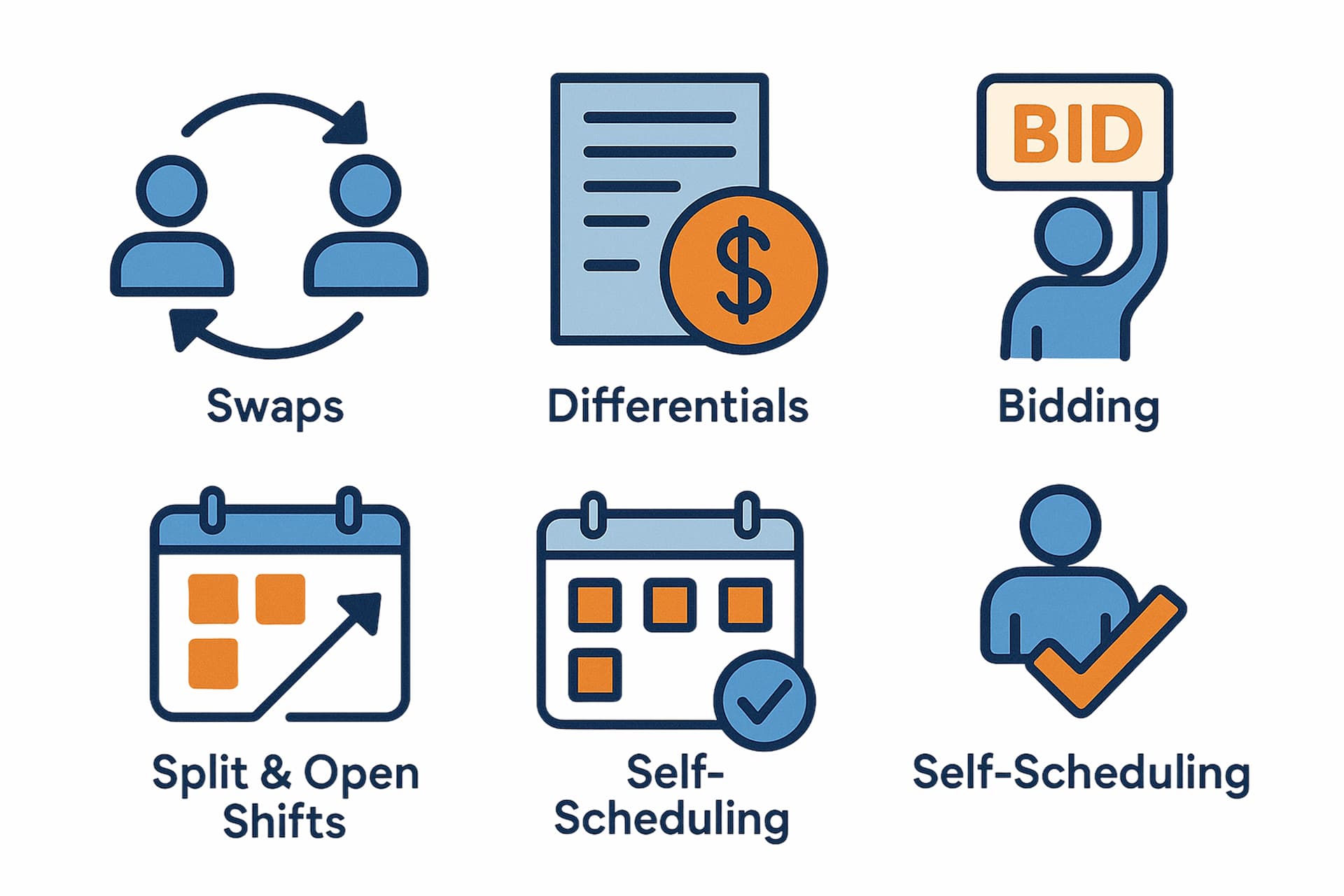Minimum Wage
Florida sets a statewide minimum wage that increases annually on September 30 until it reaches $15.00 on September 30, 2026. Local governments are generally preempted from setting higher private-sector minimum wages.
Statewide rate (current). $14.00/hour effective September 30, 2025 for most nonexempt employees.
Scheduled increase. Florida’s minimum wage rises to $15.00/hour on September 30, 2026 under the state constitution (Amendment 2).
Local preemption. Florida law preempts cities/counties from requiring private employers to provide higher minimum wages or certain employment benefits not mandated by state/federal law.
- Employers must post the official Florida minimum wage notice each year.
- Youth/training wages follow federal rules; no separate state training wage beyond federal allowances.
Tipped Minimum Wage
Florida permits a fixed tip credit of $3.02 against the regular state minimum wage for eligible tipped employees.
Cash wage (current). $10.98/hour as of September 30, 2025 (regular minimum $14.00 minus $3.02 tip credit).
Make-whole rule. If tips + cash wage do not reach the full state minimum wage for the workweek, the employer must make up the difference.
Tip ownership/pooling. Tips belong to employees. Valid tip pools may be allowed, but managers/supervisors cannot keep employees’ tips.
- Service charges are not tips and must be treated as employer revenue for wage calculations.
- Keep clear written policies and accurate tip records.
Overtime Laws
Florida has no separate state overtime statute; covered employers must comply with the federal Fair Labor Standards Act (FLSA).
Standard rule. Pay at least 1.5× the regular rate for hours over 40 in a workweek for nonexempt employees.
Regular rate. Includes nondiscretionary bonuses, commissions, and differentials; excludes certain discretionary bonuses and reimbursements.
Exemptions. Executive, administrative, professional, certain computer employees, outside sales, and some highly compensated roles may be exempt if they meet duties/salary tests.
- Overtime is weekly under federal law; Florida does not require daily overtime.
- Maintain accurate daily/weekly time and pay records.
Meal and Rest Breaks
Florida does not mandate meal or rest breaks for most adult private-sector employees. Federal rules govern whether employer-provided breaks are paid.
Adults (18+). No state-required meal or rest breaks. If employers provide short breaks of about 5–20 minutes, they are generally paid under federal law. Bona fide 30-minute+ meal periods where employees are fully relieved of duty are generally unpaid.
Minors. Florida requires an uninterrupted 30-minute break for minors when scheduled to work 8 or more hours in a day and prohibits more than 4 hours of continuous work without that break.
- Publish clear, consistent policies and train supervisors on compliance.
- Public-sector contracts or special industries may impose additional requirements.
Leave and Holidays
Florida does not require private employers to offer paid vacation, paid holidays, or paid sick leave. Limited state leave protections apply alongside federal FMLA.
Vacation leave. Not required by state law. If offered, terms follow the employer’s policy or contract (e.g., accrual, rollover, payout).
Paid sick leave. No statewide requirement for private employers. Florida law preempts local governments from mandating private-sector paid sick leave/benefit ordinances.
Holidays. Not required by state law; holiday hours are treated as regular hours unless the employer provides premium pay by policy/contract.
Domestic/Sexual Violence Leave (state). Employers with 50+ employees must allow eligible employees up to 3 working days of leave in a 12-month period for specified reasons related to domestic or sexual violence affecting the employee or a family/household member. Leave may be paid or unpaid per employer policy.
FMLA (federal). Employers with 50+ employees must provide up to 12 weeks of unpaid, job-protected leave (26 weeks for military caregiver) to eligible employees; maintain health benefits and reinstatement rights.
- Document eligibility, notice, and verification requirements consistently.
- Ensure handbooks reflect Florida preemption and any federal/state postings.
Child Labor Laws
Florida’s child labor rules generally align with (and sometimes are stricter than) federal standards. Employers must follow whichever rule is more protective.
Under 14. Employment is generally prohibited with limited exceptions (e.g., newspaper delivery, entertainment with permits, work for a parent in a non-hazardous business).
Ages 14–15 (Florida highlights). Not during school hours. Limits on evening work and total hours; Florida caps are stricter during school weeks than federal rules (e.g., 3 hours on a school day; weekly caps apply).
Ages 16–17 (Florida highlights). Restrictions apply on school nights (e.g., latest end times and weekly caps when school is in session); certain extended hours may be allowed on Sundays/holidays. Hazardous occupations remain prohibited until 18.
Breaks for minors. If scheduled to work 8+ hours in a day, minors must receive at least a 30-minute uninterrupted meal break and may not work more than 4 consecutive hours without that break.
- Verify age and keep required documentation; follow school-in-session rules.
- When state and federal limits differ, apply the stricter standard.
- Hazardous occupations lists under federal law apply until age 18.
Hiring and Firing
Florida is an at-will employment state. Employers must comply with federal and state anti-discrimination, retaliation, and background-check laws.
At-will status. Employment may be ended by either party at any time for any lawful reason, absent an agreement to the contrary.
Anti-discrimination. Employers may not discriminate based on protected characteristics under federal law (e.g., race, color, religion, sex including pregnancy, national origin, age 40+, disability, genetic information). State law mirrors these prohibitions.
Retaliation. Adverse actions for protected activity (e.g., reporting discrimination/safety issues, wage complaints) are unlawful.
Background checks (FCRA). Obtain written authorization; provide pre-adverse and adverse action notices if taking action based on a consumer report.
- Keep job postings, interview notes, and decisions job-related and consistently applied.
- Train managers on equal employment opportunity and documentation.
Disclaimer:
The information provided is for general informational purposes only and is not legal advice. Always confirm with official Florida and federal sources. Shifts by Everhour helps automate compliance but does not replace legal or payroll consultation.



